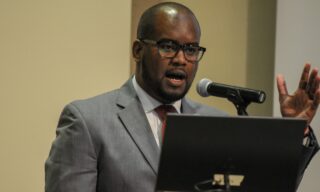
(Photos: J. Maus/BikePortland)
“How can you call yourself a bike-friendly town if you have people of color who are afraid to leave their house? How do you even accept these awards? It’s a moral question.”
Those comments are why Charles Brown (@CTBrown1911) is a name that won’t soon be forgotten by the hundreds of people in attendance at his keynote speech during the Oregon Active Transportation Conference last week.
Brown, a researcher and transportation justice activist, delivered some very real talk to the policymakers, advocates, and agency staffers in the room — several of whom audibly gasped when he questioned our bike-friendly status viewed through a lens of racial justice.
Advertisement
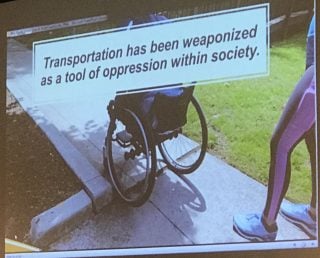
Brown’s presentation — which was equal parts funny, endearing, and searing — touched on many facets of how racial discrimination and mobility are linked. His comments had even more resonance in a place with as many white people as Portland where race-related missteps are still too common.
The comments came during a Q & A session when someone asked about a slide in Brown’s presentation that read, “Transportation has been weaponized as a tool of oppression.” A woman in the crowd (who was white) asked if the “weaponization” was assumed to come with malintent.
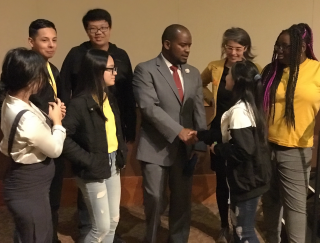
“Yes,” Brown answered without hesitation. “Because history shows it was intentional.”
It’s a history that is all too present for some. Brown’s provocative comments about our “bike-friendly” reputation were inspired by an experience he had during a focus group session in Portland. He said he met a black muslim woman who said the only way she’d ride a bike in Portland is if, “Someone put a gun to my head.”
Brown said he was taken aback. “I have no training on how respond to something like that,” he said.
Brown’s keynote was just one of many threads throughout the summit that wove between transportation and racial justice. It’s a credit to event organizers at The Street Trust that many of the breakout sessions featured topics and conversations that put equity, inclusion, and race front-and-center.
We talk about these things a lot in Portland. I think it takes someone like Charles Brown for us to actually hear it.
— Jonathan Maus: (503) 706-8804, @jonathan_maus on Twitter and jonathan@bikeportland.org
Never miss a story. Sign-up for the daily BP Headlines email.
BikePortland needs your support.



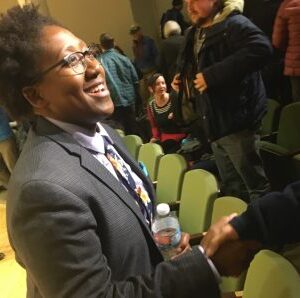
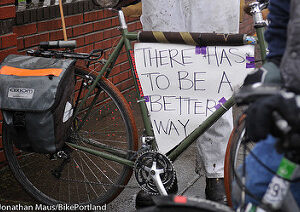
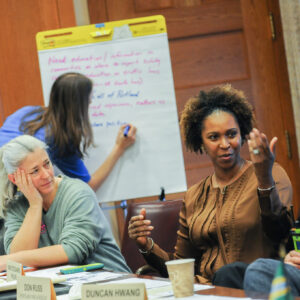

Thanks for reading.
BikePortland has served this community with independent community journalism since 2005. We rely on subscriptions from readers like you to survive. Your financial support is vital in keeping this valuable resource alive and well.
Please subscribe today to strengthen and expand our work.
Is there a transcript anywhere of his talk at the summit?
Not sure. I recorded it but need to transcribe. I’m sure he’d share the text.
The transcript will make your jaw drop. It was a powerful speech delivered with conviction, and he had the stage presence to go with it.
Do you have the transcript? If so, I’d appreciate a link.
Where can someone find all the videos for the Oregon Active Transportation Conference last week?
Some examples of cycling infrastructure that has received *enormous* attention from cycling advocates:
* NE Williams/Couch and Rodney Neighborhood Greenway
* NE Multnomah Protected Bike Lanes
* Better Naito
* NE 7th Neighborhood Greenway
* Green Loop
Some examples of cycling infrastructure that has been largely ignored by cycling advocates:
* 100s Neighborhood Greenway#
* 130s Neighborhood Greenway#
* 150s Neighborhood Greenway#
* 4M Neighborhood Greenway
A map illustrating displacement of people of color from NE/N Portland to outlying areas, including outer SE Portland:
http://media.oregonlive.com/pacific-northwest-news/photo/censusgraphicscountiesjpg-fe2d62be7f32f0f0.jpg
*All fully funded for many years.
I like that the majority of that map shows increased diversity. There are a lot less 90% white spaces.
I think the point Soren may have been trying to make is that blacks have been driven out of Albina Humboldt. But yeah, the maps do seem to show increasing diversity across the board.
Silent Barriers to Bicycling
Part 1: http://betterbikeshare.org/2017/02/15/silent-barriers-bicycling-part-exploring-black-latino-bicycling-experiences/
2: http://betterbikeshare.org/2017/02/23/silent-barriers-bicycling-part-ii-fear-crime-among-blacks-latinos/
3: http://betterbikeshare.org/2017/03/03/silent-barriers-bicycling-part-iii-racial-profiling-black-latino-community/
4: http://betterbikeshare.org/2017/03/10/silent-barriers-bicycling-part-iv-infrastructure-black-latino-neighborhoods/
One of those blog posts mentioned the silent fear of showing up looking sweaty and disheveled. I know a lot of white people who don’t bike because of that fear, but it looks like that fear is maybe a lot stronger in non-white communities – and is a bigger barrier to biking.
Not worrying about showing up sweaty and disheveled = privilege. And yep, that’s a privilege I pretty much take for granted. How can I share this privilege?
My employer provides a shower and locker room, so not really sure how I can share my “privilege”? Maybe folks with concerns of showing up disheveled to their job should take it up with their employer and lobby for more amenities?
Thanks for this, Jonathan.
Here in the comments some of these discrepancies, the cluelessness, the impatience related to transportation & racism are unfortunately ever present
9watts said: “Here in the comments some of these discrepancies, the cluelessness, the impatience related to transportation & racism are unfortunately ever present”
Which comments are you referring to?
Read any thread here With an ear for how our African American neighbors are characterized, treated, dismissed: Williams Ave., Harriet Tubman MS, the Seventh Ave bikeway, and the list goes on.
Stereotyping again?
It seems to be your pastime to demean and accuse BikePortland commenters of racism.
I see none on this thread at all.
Please point it out for us?
I never suggested comments in *this* thread were problematic. I’m sorry you misread that.
“Read any thread here”
So which thread are the Bike Portland commenters racists?
Seriously, you throw this out all the time, give me an example of a racist comment on this site.
For this exchange to be fruitful, for this to go anywhere, you need to be open to hearing someone with a different perspective from yours, allow that you might not be omniscient,have it all figured out. I haven’t really gotten that impression from your comments here so far. But let’s give this a try anyway.
The linked discussion above takes you to a torrent of comments about the recent PBOT decision not to put the bikeway on seventh. I invite you to read keviniano’s comment from that thread:
https://bikeportland.org/2019/03/21/pbot-says-9th-avenue-will-be-route-for-future-lloyd-to-woodlawn-greenway-297239#comment-7069369
I’m. It the only one who comes away from these conversations with a sense that we (bikeportland commenters) could do better on this subject.
9watts, I always enjoy and often appreciate your opinions. Are you open to ALL the different perspective? I’d be curios to get your take after checking out the website I listed below (Quillette, Aeromagazine, Heterodoxacademy).
Thanks for your comment and posts.
To your question, I am open to ALL perspectives, and actively interested in those which are well reasoned, or which we can debate, interrogate, try to understand. The aspect of bikeportland comments I find frustrating is when folks just keep restating their ill-considered, often shouted, indictments, and refuse to engage, listen, learn, and thus fail to teach the rest of us anything interesting. The culture, practice, and habit of conversation and argument are not familiar to all who post here, and I would love to move some of the more acrimonious discussions in that direction.
One Thread does not make “read any thread here”… so hyperbole
about how many racists post here is just that….
Again, you try to discern who I and other people are through website comments..
You are the person here who puts everyone here in a box…
Right.
Whatever.
“Again, you try to discern who I and other people are through website comments”
What are you doing?
Mr. “You are the person here who puts everyone here in a box…”
Are they dismissed because they are African American, or because they oppose much needed safety oriented bicycle infrastructure? Behold the scorn heaped on one woman who tried to save some trees next to the Springwater extension — race wasn’t part of that, and she was pilloried by several commenters for… well I never did figure out what for. For something. Many here dismiss anything and anyone that doesn’t adhere (or appear to adhere) to our narrative. We call them NIMBY and car head and cager, and are pretty good at mischaracterizing, mistreating, and dismissing those with different views, regardless of race.
Whether or not you agree, I would challenge you to defend people without consideration of their race. If you see someone being mischaracterized, mistreated, or dismissed for whatever reason, call it out. Don’t use race as a basis for defending one person or group and piling on to another.
“I would challenge you to defend people without consideration of their race. If you see someone being mischaracterized, mistreated, or dismissed for whatever reason, call it out. Don’t use race as a basis for defending one person or group and piling on to another.”
Without consideration of race? Hm. Doesn’t sound very auspicious (in 2019) to me. As for calling this out, I’m not sure why you are exhorting me to do this. I think I’m pretty good at that, have little hesitation do do this. You of all people should know that.
“Are they dismissed because they are African American?”
The topic of the article which we are commenting on is race. Which is why I posted the comment to which you are responding. In the bikeportland comments many things are said, many perspectives criticized. Here I was speaking to one of many dimensions within these comments, which is that, yes, race does factor in, is relevant, and concerning, as the speaker also noted. The fact that this makes you and others here uncomfortable, that you reflexively reject the topic, the category, want us to ignore race but should tell us something.
ah, the old “you’re racist so you’re wrong approach”.
” I would challenge you to defend people without consideration of their race.”
This makes me extremely uncomfortable. It smacks of the “all lives matter” refrain, and I think it misses the point that race IS a factor in nearly everything.
Exactly. Thank you for putting it so succinctly.
Actually, it’s nothing like “all lives matter”, except on the most superficial level.
Care to explain how/consider the fact that if you have to explain how it’s different, maybe you need to consider your words more carefully?
I don’t have to explain why what I said is nothing like “All Lives Matter”: I think it is self-evident. It’s hard for me to understand where you see any similarity.
At the risk of being tone deaf, I think “all lives matter” is true enough. For those that don’t understand why it isn’t “good enough” to stop there, my take is that, yes—all lives DO matter. However, there are some lives that society assumes matter, and others for which some folks have to consciously remind themselves that they matter. Call it “Race Head” if you’re not into -isms.
None of my neighbors of color seem to be scared of leaving their homes in their cars.
And you know this how? Which neighbors of color are you talking to about their concerns about disproportionate policing and their experiences as people of color in Portland? How do you know folks aren’t leaving their homes with fear?
And 7th ave bikeway. Hundred and hundreds of homeowners, and businesses all okay with with the route. One housing non profit, and one owner of a driveway get to call the shots. The reason this neighborhood is the worst in the city.
The worst in the city? Please. Have you ever tried to ride a bike east of 205?
Can we expect different outcomes until we fundamentally change how we make the decisions allocating transportation and other public funding and who gets to decide?
The City of Seattle’s “Your Voice Your Choice” program now allocates $3 million to parks and streets through a participatory budgeting process. The process is open to everyone but takes a targeted universalist approach centered communities of color and weighting funds to communities that are the least served and the least represented:
https://www.youtube.com/watch?v=QkVAU0ufbSM&list=PLdDnNaA70-ugq4WbNj2TNjp8QGLQ2U_st
Quick primer on participatory budgeting here:
https://vimeo.com/77157163
We are into our third round of Participatory Budgeting here in Greensboro, $100,000 for each of our 5 districts (wards), which is about 1% of the total city budget. It will not surprise you in the least that within each district, black or white, wealthier neighborhoods with more active citizens get more projects approved and implemented, while poorer neighborhoods with more youth, immigrants and migrant workers get virtually nothing. Art and playground projects are usually implemented right after community and city council approval, followed by turn lanes for cars on busy streets. We are still waiting for any bike or pedestrian projects that were approved to be actually implemented, even from the first round in 2015/16.
I personally participate(d) as both a facilitator and as a budget delegate (project designer) on all three cycles, including on nearly all the bike projects. I also helped get two people on to the city’s PB commission and have personally discussed projects with city staff and two of our 9 city councilors.
We heard from former City Councilor Jamal Fox (who successfully championed and implemented of PB before you moved there) at the forum we had on PB here in Portland last year (https://www.pboregon.org/april-14-forum). He reported that, while PB is no silver bullet, it greatly increased the number and diversity of people involved in City Budget decisions, that the age, races, and incomes of PB participants generally reflected that of the City’s population whereas before it was mostly affluent whites involved in discussions. He also talked about how specific PB project outcomes (a chess board in a park) provoked new conversations about what were the real priorities of the community and offered people unhappy with specific outcomes a direct way to impact decisions in future years, creating a positive feedback loop of increasing engagement. Research on PB indicates this dynamic is common in cities where PB has been implemented. It is certainly played out in Seattle which has also developed policies to support low-income people in process design as well as implementation. Even if the project outcomes initially lean toward those favored by more educated and affluent initially, the outcomes in aggregate are almost always a better reflection of a broader swath of the community than old-style budgeting driven by the affluent and educated through traditional channels of “community involvement.” Moreover the greater accessibility and transparency of the process creates an opportunity for more equitable outcomes with successive cycles of PB. The research in Brazil that has examined at PB over decades of implementation points to this dynamic. Overtime PB and other forms of participatory democracy shift the discussion about what are the real priorities of the community and that has consistently been toward pro-poor priorities. That’s because the specific outcomes are less significant than the spill over effects of having more and a greater diversity of people involved in making the decisions.
Jamal Fox…who successfully championed and implemented of PB in Greensboro….
Yeah, there’s a lot of people who miss Jamal Fox here in Greensboro. Youngest city councilor in over 100 years when he was first elected, professor at A&T, represented the predominantly black east side. I briefly met him before he left to work for Portland Parks & Rec.
Jim, you are right about everything you wrote. PB (which some city employees refer to Peanut Butter) has changed the conversation for city council, many (but not all) city agencies, and the 1% in our community who attend public meetings, serve on boards, run churches, EPAP-like organizations, nonprofits, and attend VIP events. The most ardent councilors opposed to it got voted out. And participation is important in a community where 80% of eligible voters are registered (mostly Democrat), but only 14% of whom voted in the last Council election for any candidate and a paltry 4% in the last sheriff election.
That said, 1% of a city budget for PB is nearly nothing.
True. 1% is much especially when compared to places like Paris and Madrid where they are doing upwards to 10% and billions dollars in PB. Not surprisingly Jamal was one of the City Councilors pushing for Greensboro’s PB process to launch at 5% of the City budget:
https://youtu.be/BQVuo-1ZaFg?t=350
I guess getting PB going is one thing but expanding it to be more meaningful and impactful presents a different challenge. We have a long way to go in Portland.
I mean: True…. 1% or $500k in a city of is NOT much. Apparently Greensboro had a $530 million budget and a population of roughly 290K when PB launched.
“People should not be judged by the color of their skin, but by the content of their character.”
White people like to tell this to people of color a lot. If this were what was happening, I’m sure folks of color would be glad to go along.
I really appreciate all your comments here in these threads, Joan. I hope you stick around.
Jonathan, hope you are able to provide more detail in future posts or guest posts on this topic. It would also be good to see examples of how other communities are doing this right. Thanks.
I am puzzled why “colored people” is considered a slur and “people of color” an encomium. Does a grammatical flim flam change meanings or attitudes?
Joan’s post is a not so subtle racist insult directed at me. I am asking you to take it down, Jonathan.
I honestly don’t know what race you are or why you made your original comment, the quotation. I do understand why people of African descent would be aggrieved.
*their ancestors were kidnapped, sold and brutalized for generations
*the fruit of their labor was taken from them under color of law and religion and not returned –‘I’m sorry your ancestor was Sold South but it kept us in business, would you like a scholarship?’
*any degree of African descent was taken as license for more of the above
*etc, etc, through yesterday, in spite of Constitutional Amendments
(Clearly not just African Americans have been singled out, many others have too. Native Americans, notably. People from almost any part of Asia. Anybody who can be identified can be “othered”.)
If people find dignity in choosing a name, I’m for it. And that quote directed at an identifiable person of color is a slap with a promise not yet kept.
I generally keep to myself on these subjects of race, privilege, hate, group identity etc. as there usually isn’t a forum with people of diverse opinions to share with. But being that Bikeportland seems to have a nice mix of ideologies, I’ll throw it out there.
I’m a white dude with a fair amount of native blood in me, so much so that as a kid growing up lower middle-class in urban Dallas, TX, I’d often be darker than my latino and black friends during the summer (I was made fun of for such, but wouldn’t’ fathom crying ‘victim’). Though, I’ve been told my blood has Cherokee and it is quite obvious from facial features of my relatives, I’ve never had the urge to explore my ancestry as a way to seek identity; I’m me and personally don’t see the importance about that sort of thing. Neither did much of the mixed ‘race’ crew that I hung with, and to this day, all the pop cultural notions of identity, hate, etc. are lost on the friends from childhood I keep up with.
I know childhood can be a rocky time, especially if born into a low socio-economic situation and/or dysfunctional family. I had both and I’ve spent a fair amount of my adult life figuring myself out and consequently working with kids in theses categories as a mentor, special education teacher (at Donald Long juvenile detention center, among other places). When you become an adult, the game starts over (if you want it to). You might be behind, but from my experience as a receiver and giver, there are many resources out there if you are interested in making something of your life. The hearts of many “allies” are definitely in the right place (I;m by nature a bleeding heart), but I’m afraid they are naïve about the human condition, both positively and negatively: we are much more capable than we often think we are (thanks Pooh) and more depraved and selfish than we’d care to acknowledge (my hand is raised high:) So many progressive ideas come from a very good place, but the unintended and natural consequences are seemingly rarely taken into account. Unfortunately, we can’t always engineer our way out of these realities.
So, when I hear things like ‘voices of color need to be heard”, I wonder if that means all voices or just those that fit the prevailing pop narrative. Does it include me and the diverse crew I grew up with? Disregarded black thinkers like Thomas Sowell, Larry Eldridge, Jim Brown, Candace Owens, etc? If we are truly want to hear diverse opinions, maybe set down Vox, The Atlantic, Slate, NYT, etc . and consider outlets such as Quilette.com, Areomagazine.com or heterodoxacademy.org if nothing more than to broaden your perspective. Pieces specific to Portland: https://quillette.com/?s=Portland&submit=Search I don’t wholly agree with everything I read on these sites, but they offer a perhaps more honest anecdotal (yet somewhat disturbing) take on the issues of the day.
So I didn’t hear this presentation, but am interested in the transcript or recording if available. Lot more to say, but too little time…
An interesting take on the fracas around the racial ugliness that arose around that issue. I don’t agree with everything in that piece but did learn some things. One dimension the piece didn’t explore as much as it might have is the way gentrification (to pick just one of many possible terms to describe the present and often poorly understood trauma of inequality) may produce resentment, hatred, animosity that can lead to people-behaving-badly in situations like this.
A transcript would be very interesting for those of us wondering what the rationale is for the provocative claims called out in this post. I’m a big fan of asking “why?” in an attempt to get to root causes, and identify points of attack for finding solutions. Blaming “racism” may be accurate, but it is not precise. Fixing racism is super hard, but we do have the ability to change our behavior (individually and as a society) and do smaller things differently to alleviate some of the burden that has been placed on certain segments of our population due to nebulous racism. How has transportation been “weaponized”? By intentionally underserving (via lack of public transportation service or pedestrian infrastructure) poor or minority communities? By an increasing prevalence of “pretext stops” of minority drivers (or bicyclists)? By failure to investigate traffic deaths of minority victims? By building freeways through historically black (or other minority) neighborhoods? No doubt all of the above; are any of those things individually addressable?
Given these historical realities, how do they influence the perception of new projects? What are the true fears that arise around infrastructure “improvement” projects in certain neighborhoods? Gentrification (I’ll be forced to move because my rent will skyrocket)? Changing demographics? Higher traffic levels and speeds (my kids/grandma will get run over for sure)? Loss of parking (my business will suffer because my customers can’t park anywhere)? Feeling railroaded into accepting yet another neighborhood disruption (they’ve already put in a freeway and widened the streets, gentrification has already started, and now yet another “project” that benefits everybody but me)? Are any of those fears individually addressable?
Beyond new projects, what are the fears around using the transpo infrastructure we already have? I would be extremely interested in why the lady about whom he related the “gun to my head” anecdote feels that way. Because riding a bike is undignified? Because her neighborhood feels so dangerous that she fears being attacked if not in a car or on a bus? Because motor traffic is too scary? Can any of those individual concerns be mitigated?
I don’t know whether I completely “get” JBone’s very interesting comment above, but something tells me we have a propensity to get hung up on hashtags and “pop sociology” rather than hearing and attempting to understand the feelings and experiences of actual people as individuals. I’m as ignorant as the next guy, but I would love to move beyond bumper-sticker philosophy and parsing the semantics and nuances of labels.
This was an excellent post.
Comment of the week nomination!
Asks some good questions.
I’ve been pointing this out for years on this site and constantly got shutdown. I’m glad to see Maus might actually start listening along with his followers. If you want to see diversity, ride the bus. If you want to be with a bunch of white people, ride your bike.
Overtly bigoted and racist positions are tolerated for the sake of enabling “diverse opinions” while those who call this behavior out are chastised for being “divisive” or “shutting down conversation”.